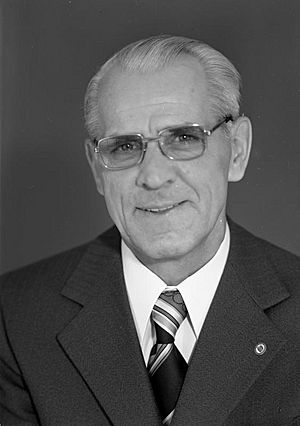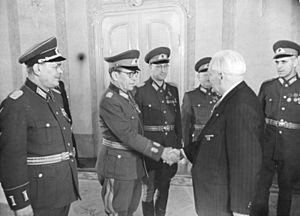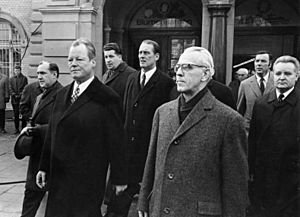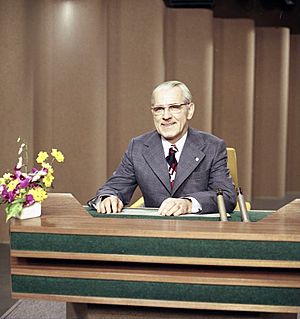Willi Stoph facts for kids
Quick facts for kids
Willi Stoph
|
|
|---|---|

Stoph in 1976
|
|
| Chairman of the Council of Ministers | |
| In office 21 September 1964 – 3 October 1973 |
|
| President | Walter Ulbricht |
| Preceded by | Otto Grotewohl |
| Succeeded by | Horst Sindermann |
| In office 29 October 1976 – 13 November 1989 |
|
| President | Erich Honecker |
| Preceded by | Horst Sindermann |
| Succeeded by | Hans Modrow |
| Chairman of the State Council | |
| In office 3 October 1973 – 29 October 1976 |
|
| Prime Minister | Horst Sindermann |
| Preceded by | Walter Ulbricht |
| Succeeded by | Erich Honecker |
| Minister of National Defence | |
| In office 1 March 1956 – 14 July 1960 |
|
| Prime Minister | Otto Grotewohl |
| Preceded by | Position established |
| Succeeded by | Heinz Hoffmann |
| Minister of the Interior | |
| In office 6 May 1952 – 1 July 1955 |
|
| Prime Minister | Otto Grotewohl |
| Preceded by | Karl Steinhoff |
| Succeeded by | Karl Maron |
| Personal details | |
| Born | 9 July 1914 Berlin, Prussia, German Empire |
| Died | 13 April 1999 (aged 84) Berlin, Germany |
| Political party | KPD (1928–1946) SED (1946–1990) |
| Profession | Engineer |
Willi Stoph (born Wilhelm Stoph on July 9, 1914 – died April 13, 1999) was an important German politician. He played a big role in the government of East Germany, also known as the German Democratic Republic (GDR). He served as the Prime Minister of East Germany for many years. He was also the head of state for a period.
Contents
Willi Stoph's Early Life and Career
Willi Stoph was born in Berlin in 1914. Sadly, his father passed away the next year during World War I. When he was 14, in 1928, Stoph joined the Communist Youth League of Germany. A few years later, in 1931, he became a member of the Communist Party of Germany.
Stoph served in the German army, called the Wehrmacht, from 1935 to 1937. He also fought during World War II from 1940 to 1945. He earned a medal called the Iron Cross 2nd Class. By the end of the war, he had reached the rank of Unteroffizier, which is a non-commissioned officer.
After World War II ended, Stoph worked with the Socialist Unity Party. This party was very powerful in the part of Germany that became East Germany.

Becoming a Key Leader in East Germany
When East Germany was formed in 1949, Willi Stoph quickly became a key figure. In 1950, he joined the Central Committee of the Socialist Unity Party of Germany (SED). He also became a member of the Volkskammer, which was East Germany's parliament.
Stoph was named to the Politburo in 1953. This was a very powerful group that made important decisions for the country. He served as the Minister of the Interior from 1952 to 1955. Then, he became East Germany's first Minister of Defense from 1956 to 1960. As Defense Minister, he was given the high rank of Armeegeneral.
Stoph's Time as Prime Minister
From 1960 to 1964, Stoph was the first deputy Prime Minister. In 1964, he became the Prime Minister, officially called the Chairman of the Council of Ministers. He took over after the previous Prime Minister, Otto Grotewohl, passed away. Stoph had actually been doing the job since 1960 because Grotewohl was very ill.
Many people thought Stoph would become the top leader after Walter Ulbricht, who was the longtime head of the party. However, another politician named Erich Honecker became more powerful.
After Ulbricht died in 1973, Stoph became the Chairman of the Council of State. This position was like being the president of East Germany. But in 1976, Honecker changed how the government was set up. He believed the next Prime Minister, Horst Sindermann, was too open-minded about the economy. So, Honecker replaced Sindermann with Stoph, making Stoph Prime Minister again.
Important Meetings and Role in Government
During his first time as Prime Minister, Stoph started talks with West German Chancellor Willy Brandt in 1970. This was a very important moment. It was the first time the leaders of East and West Germany had ever met.
Willi Stoph was known as someone who would always follow the directions of the powerful Politburo. This is why Honecker chose him to be Prime Minister for a second time. Stoph was a very loyal supporter of Honecker. Even though Stoph held a high government position, Honecker was actually more powerful because he was the general secretary of the ruling party.
Changes in Leadership and Later Life
In October 1989, Stoph joined a group of leaders who decided to remove Honecker from power. At a special meeting, Stoph himself made the motion to replace Honecker with Egon Krenz.
About a month later, on November 13, Stoph and his entire government resigned. This happened because of strong public pressure from the people of East Germany. Stoph later faced legal issues after leaving office. He was spared from being held in prison due to his health. In 1994, a court decided that money he had saved would not be returned to him.
Willi Stoph passed away in Berlin on April 13, 1999, at the age of 84. He was the last surviving leader of East Germany before Egon Krenz. He was buried in Wildau.
See also
 In Spanish: Willi Stoph para niños
In Spanish: Willi Stoph para niños
 | Calvin Brent |
 | Walter T. Bailey |
 | Martha Cassell Thompson |
 | Alberta Jeannette Cassell |



